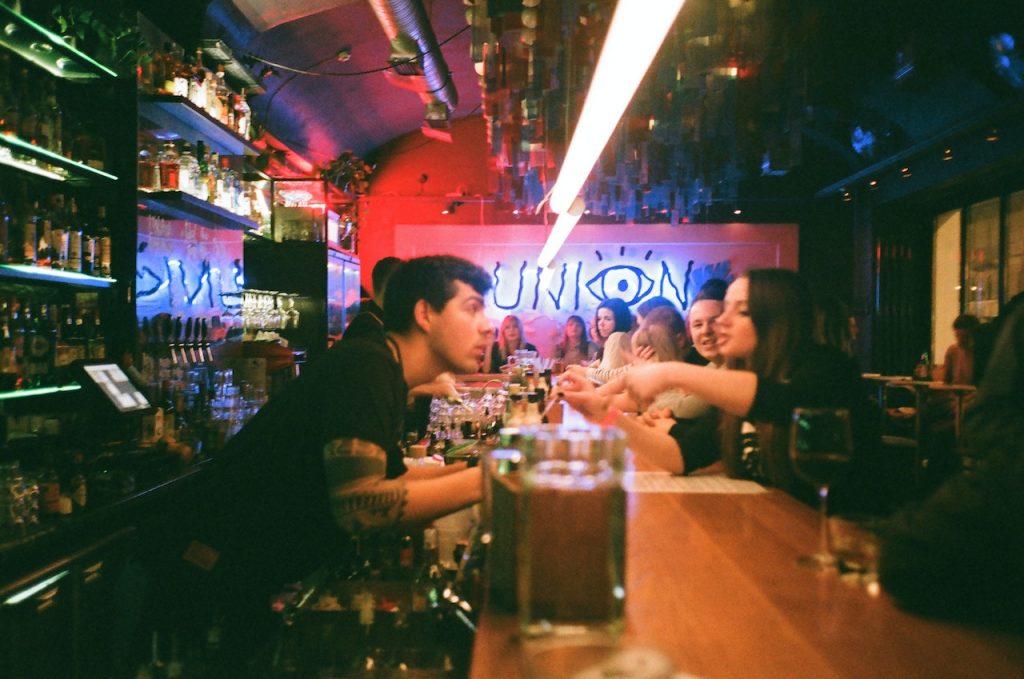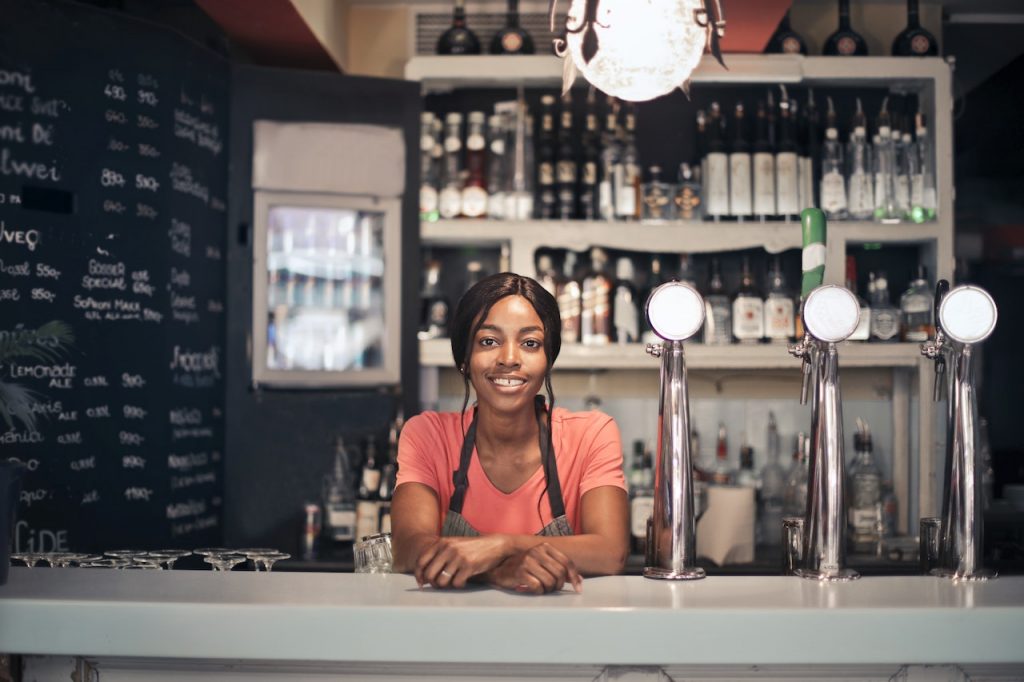Staying Sober When Your Job Involves Alcohol: Tips From Bartenders
Restaurant and bar worker culture is notoriously booze-fueled. In fact, when it comes to the professions that drink the most, food service workers rank third highest by some estimates—falling just under miners and construction workers on the list.
Anyone who’s worked in a restaurant can tell you how often you get invited out for drinks after work (often at 2 a.m.) at the bar around the corner. And with hospitality jobs on the rebound, alcohol use is becoming a concern for more and more workers. So, what do you do if bartending is your job, and you don’t want to drink?
Below we’ll share some perspectives, success stories, and tips for being a sober bartender—or any other role in the food and beverage industry.
What’s It Like To Be a Sober Bartender?
Staying sober behind the counter comes with a specific set of challenges. You’ll be working with alcohol and dealing with intoxicated people daily. You’ll need ways to navigate work stress and relationships without booze.

This also means having to say, “No, thanks,” to patrons who want to drink with you, and having to field or avoid questions about your sobriety without seeming negative. You may also face some pressure from coworkers, especially before they know you well.
Then, there’s the challenge of taste-testing drinks. It can be hard to do quality control (especially if you’re trying new recipes) without checking the flavor. Many sober bartenders adapt to tasting a small amount and spitting it out, while others rely on colleagues for feedback when trying out new cocktails. But this is another thing you’ll need to navigate.
All in all, each person has their challenges in being a sober bartender. But the good news is, more and more people are pulling it off—and having very successful careers without drinking. Many of those who bartend sober say they feel far healthier—and even better at their job—because of it.
Success Stories: Bartenders Who Flourished Without Drinking
Trying to stop drinking alcohol as a bartender might sound impossible. But the truth is, there are some incredibly successful people who have done it—and gone on to greater success than before.
Jack McGarry
Jack McGarry, co-founder of Dead Rabbit in New York City, has long been known as one of the most successful sober bartenders out there.
McGarry was named International Bartender Of The Year in 2013, early in his career. However, behind the scenes he was struggling. After waking up in a hospital after a binge drinking episode, he became sober in 2016.
Rather than slow his career down, McGarry’s reputation has only grown since then. Most recently, in the wake of the pandemic, he’s planning to open a new branch of the Dead Rabbit in New Orleans—and possibly Austin, TX as well.
Cera Grindstaff
Cera Grindstaff, of Dreamland and Stampede Cocktail Club in Seattle, is another restaurant industry professional who cut drinking out of her life and saw incredible changes because of it.
As a presenter at Bartender’s Circle Summit in March of 2022, Grindstaff discussed the rewards of being sober in the industry: “For me personally, once I got sober, doors opened that I didn’t even know were doors … My focus, sleep, eating habits, mental capacity, health, bank account … freaking everything blossomed.”
Chris Cardone
Chris Cardone is a New York City bartender—one of the better-known practitioners of “flair” bartending on the east coast. His blend of performance and skilled cocktail craftsmanship has won him awards at prestigious competitions such as Diageo.
Cardone struggled with his alcohol use for several years, hit rock bottom in 2015, and decided to get sober. How has it affected his career? According to Chris: “Not drinking has actually enhanced my life in many aspects, while it hasn’t had even one negative impact on my career or personal life … You don’t have to drink to be successful.” Tips for Staying Sober in the Bar and Restaurant Industry
If you’re ready to make the switch to sobriety (or moderation) while working in the restaurant industry, you’re certainly not alone. To make things go a little more smoothly, here are some tips that can help:
Communicate Boundaries and Ask For Support

While some coworkers may pressure you, many others will be supportive, especially if you are confident and consistent in your decision. After all, there are many other people who have made a career in food services while staying sober—you aren’t the first.
Gauge your own level of comfort in your sobriety: If you can go out to a bar without being too triggered, join coworkers to socialize and just have a soda. If not, communicate why, and seek other avenues to build friendships with those you work with.
You can also look for supportive allies in the workplace, sober or otherwise, who can be there for you during the more challenging days. There are even organizations like Ben’s Friends offering online support groups specifically for food and beverage industry workers who are sober.
Develop an Engaging, Sober Life Outside of Work
Bartenders like Jack McGarry, Adrienne Oakes, and Sam Anderson all took up running after getting sober. McGarry stated he had lost 30 pounds, while Oakes and Anderson began running marathons. Others take up creative hobbies, expand their businesses, or develop their mindfulness practice.
Finally, drinking less gives you the room to strengthen and deepen your relationships. The world outside of work can become much richer when you are sober—and given time, this can make it easier and easier to abstain. Who wants to undermine a good thing just to engage in a bit of the past?
Find New Ways to Manage Stress
Many restaurant and bar workers drink to manage stress during busy shifts, which can form a bit of a feedback cycle. Getting sober can be a chance to develop other ways to calm your nerves:
- Prioritize healthy sleep
- Take up mindfulness and practice breathing techniques
- Focus on what’s within your control
- Spend more time on self-care, especially after high-stress shifts
Consider Professional Help
The thought of trying a recovery program or counseling might feel strange, especially if you don’t consider yourself a full-blown alcoholic. But in many cases, professional help can make it easier to cope with triggers at work, create new habits, and change your relationship with alcohol.
It’s now possible to get support from your phone, which means you can do sobriety check-ins during your break, or from anywhere. Easier access to coaching support can help you learn specific skills for working sober in the bar industry.
Finally, medications like naltrexone can block some of the pleasurable effects of drinking, making it possible to cut back gradually or relearn moderation. People on naltrexone can often drink small amounts of alcohol (such as taste-testing, or a single social drink) without returning to unhealthy alcohol use.
If you’re interested in getting virtual help for controlling or quitting your alcohol use while working in the industry, get in touch with us. Ria Health’s program combines all of these approaches into one, giving you access to medication, coaching, and digital support through a smartphone app.
Will insurance cover treatment? Verify Coverage
Have Questions? Call (800) 504-5360



